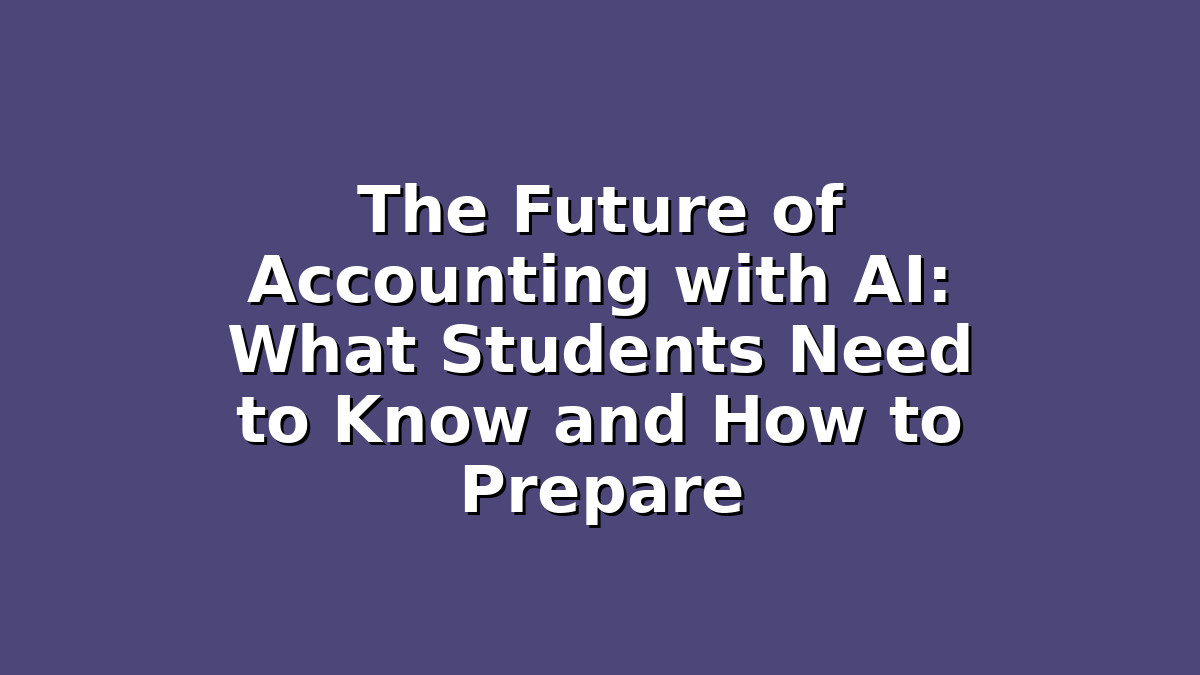As a student preparing for accounting exams or considering a future career in accounting, you may have heard a lot about artificial intelligence (AI) transforming the field. But what does the future of accounting with AI really look like? And more importantly, how can you prepare for these changes while studying? This article will guide you through the key ways AI is shaping accounting, offer practical study-related advice, and help you build the skills you’ll need to succeed in this exciting, evolving profession.
Introduction: Why AI Matters for Accounting Students
Artificial intelligence is no longer a futuristic concept—it’s already making waves in many industries, including accounting. AI technologies like machine learning, robotic process automation (RPA), and natural language processing (NLP) are automating routine accounting tasks, enhancing data analysis, and improving decision-making accuracy. For students, this means the traditional accounting roles are shifting. Instead of just crunching numbers, accountants increasingly act as strategic advisors who interpret AI-generated insights.
Understanding AI’s impact on accounting is essential for students who want to stay relevant and competitive in the job market. This article breaks down the future of accounting with AI into three main areas: automation of tasks, enhanced data analytics, and evolving skill requirements. Each section includes tips on how to study effectively and prepare for these changes.
—
1. Automation of Routine Accounting Tasks: Study How to Work Alongside AI
One of the most significant changes AI brings to accounting is automation. Software powered by AI can now perform repetitive tasks like data entry, invoice processing, bank reconciliations, and even some aspects of auditing more quickly and accurately than humans.
What this means for students: Many traditional tasks you might be studying will eventually be automated. However, instead of learning to compete with machines, your focus should be on how to collaborate with these tools. AI is here to handle the “busywork,” freeing accountants to focus on higher-level analysis, problem-solving, and client communication.
Study advice:
– Practice using accounting software with AI features. If possible, get hands-on experience with tools like QuickBooks, Xero, or cloud-based ERP systems that incorporate AI. Familiarity with these platforms will give you a distinct advantage.
– Focus on understanding underlying accounting principles. AI can automate processes, but it can’t replace your foundational knowledge. Make sure you deeply understand concepts such as GAAP, IFRS, and tax laws.
– Learn to audit AI outputs critically. AI-generated reports need human oversight to catch errors or unusual patterns. Practice questioning results and thinking critically about automated processes.
—
2. Enhanced Data Analytics: Sharpen Your Analytical and Critical Thinking Skills
AI enables accountants to analyze vast amounts of financial data quickly and uncover insights that were previously impossible to detect. From predictive forecasting to fraud detection and risk assessment, AI-powered analytics is revolutionizing how financial decisions are made.
What this means for students: The future accountant will increasingly be a data analyst and strategic advisor. It’s not enough to just prepare financial statements—you’ll need to interpret data trends, provide actionable recommendations, and communicate findings to stakeholders.
Study advice:
– Develop your data literacy. Take courses or workshops in data analytics, statistics, and Excel. Learn how to manipulate and visualize data effectively.
– Work on case studies involving financial data interpretation. Many textbooks and online resources offer real-world scenarios where you can practice extracting insights from data.
– Improve your critical thinking skills. Challenge yourself to ask “why” behind the numbers. Use practice questions that encourage analytical reasoning, not just rote memorization.
—
3. Evolving Skill Requirements: Build Soft Skills and Embrace Lifelong Learning
As AI takes over technical routine tasks, the skills that differentiate human accountants are shifting toward soft skills and continuous learning. Communication, ethical judgment, adaptability, and creativity are becoming increasingly important.
What this means for students: Your future role will demand excellent interpersonal skills to explain complex AI-driven insights to clients, collaborate with multidisciplinary teams, and make ethical decisions in ambiguous situations.
Study advice:
– Practice clear communication. Work on writing concise reports, presenting findings, and explaining technical concepts in simple terms. Join study groups or clubs where you can discuss accounting topics.
– Stay curious and updated. AI and accounting regulations evolve rapidly. Follow accounting news, attend webinars, and consider certifications in emerging areas like forensic accounting or AI ethics.
– Develop problem-solving skills. Engage in activities like case competitions or internships that require you to solve real accounting challenges, often involving technology.
—
Conclusion: Preparing for a Future Where AI and Accounting Go Hand in Hand
The integration of AI in accounting is transforming the profession but also opening exciting new doors. For students, the key to success lies in adapting your study strategies to this new landscape. Embrace technology, deepen your analytical skills, and cultivate the soft skills that machines can’t replicate. By doing so, you will not only pass your exams but also position yourself as a future-ready accountant capable of thriving alongside AI.
Remember, AI is a tool designed to enhance your work, not replace it. With the right preparation, you can become an indispensable professional who leverages AI to deliver greater value and insight.
Keep pushing forward, stay curious, and enjoy the journey toward becoming a next-generation accountant!
—

Responses